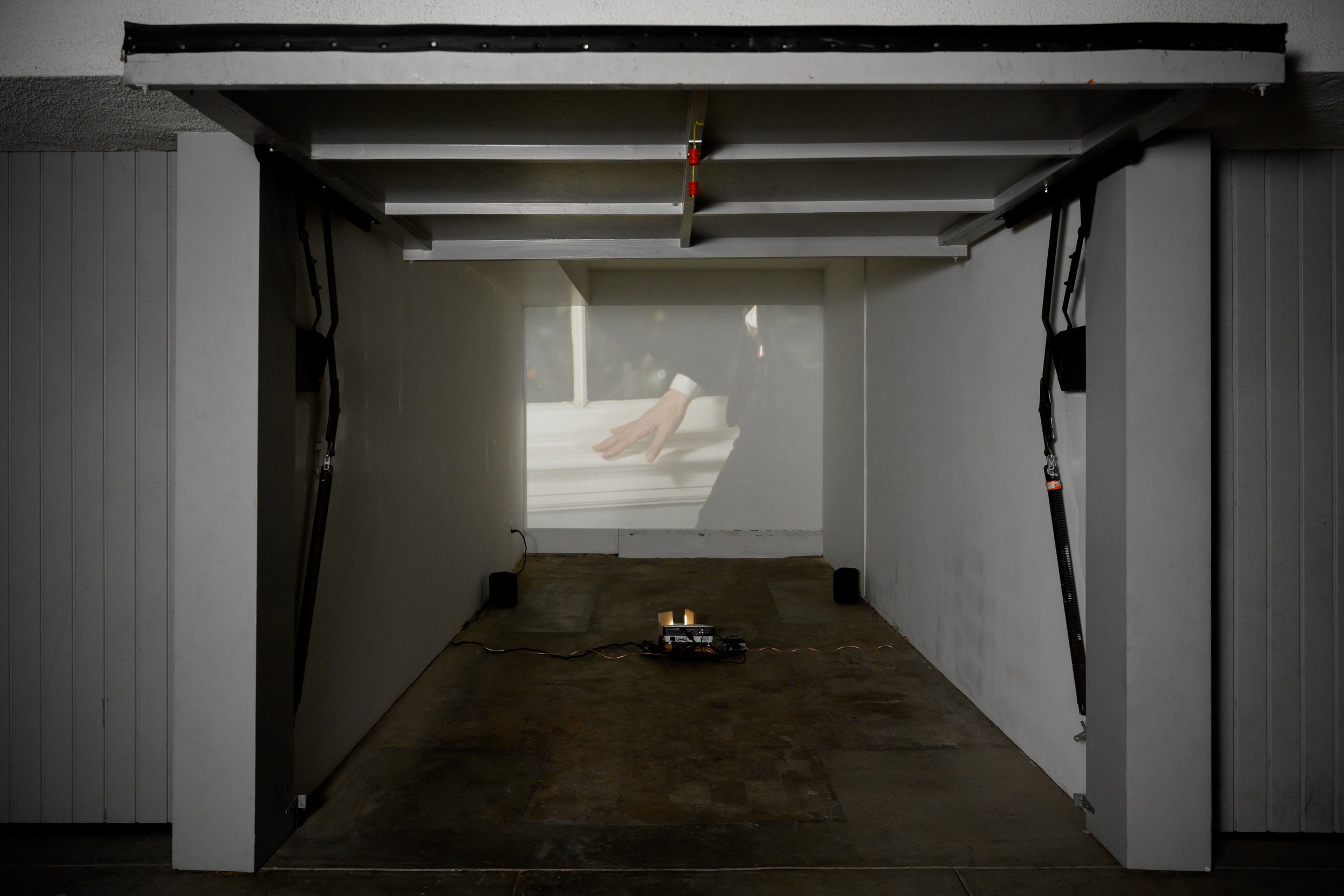Installation view of Final Projects: Group XLIX. Photography by Tag Christof, 2020.
Veronika Eberhart´s multi-layered work orbits around “The House of Un-American Activities” (HUAC) hearings of Austrian composer Hanns Eisler and the correspondence of his wife Lou Eisler. Both were living in the US between the years 1938 and 1948 as emigrants. Hanns Eisler, who emerged from the European Avant-garde and was best known for his collaborations with Bertold Brecht, aimed to compose music for the masses and to heighten workers’ group identity. Shortly after their settling in California they became a target of intense investigation by the FBI that involved an elaborate series of wiretaps, tails, and break-ins that lasted for 6 years. In 1947 Hanns Eisler had to appear in front of the HUAC.
The first of these “secret hearings” took place at the Biltmore Hotel in Los Angeles. The building, also known for being an early home to the Oscars ceremony, served as a filming location for many movies and TV-shows. Eberhart`s research gathers and expands on the transcripts of the hearings to films shot at the hotel and the archived letters of Lou Eisler. Furthermore, the artist came across two bootleg recordings released by the record label Timely in 1937, which were the subject of the interrogations against Eisler. She made re-pressings of the songs on vinyl in collaboration with Vinylograph which are included in the exhibition.
Her new series consists of a 16mm film, photographs, a sculpture, and an edition of vinyl records. By combining archival footage, scenes from films, and original material–in collaboration with musician and author Ian F. Svenonius (cast) and Chloe Reyes (camera)– Eberhart`s recurring interest lies in revisiting historical scenes to alter public narratives. Her search for buried layers fuels her investigation into social histories and reflects on relations between music and its impact on the masses, whilst stirring up diverse timelines.
Join her for the special program 4 Songs in Apartment 3 (“Raise up”, “In Praise of Learning”, “United Front”, “The Soup Song” by Berthold Brecht, Hanns Eisler, Maurice Sugar, Marc Blitzstein, respectively) on Sunday, March 8 at 4:00 PM. RSVP to studio@veronikaeberhart.com.
Ting-Jung Chen’s project is based on her exploration of the Rose Parade in Los Angeles, a procession that has taken place annually for 131 years. The parade attracts attendees who line up along the route, temporarily altering the city’s infrastructure. Its famous flower-covered floats are not only spectacular attractions, but also work as a symbol of prosperity. They function as a formalization of a community’s vision, the volunteers’ commitment, and an expression of an economic process.
Chen surveys the structural qualities of the festival and its social and political implications. By questing the notion of “being together” she reveals the political and economic complexity of the parade and its impact on the communities it claims to represent.
Chen explores the media reports and collects ephemera from the site while conducting a micro-field-study. She transfers the given material into The Names, an assemblage of sound, image, text, and objects. Together they depict a story that calls into question the relationship between propaganda, cultural commodification, ephemeral content, and collective memories.
Jakob Sellaoui’s The garage will do is a temporary installation in the backyard space of the Mackey Apartments that includes invited talks by ten LA-based artists, architects and writers. The project draws upon a quote by Frank Lloyd Wright referring to R.M. Schindler’s buildings as well-designed, but badly executed. He nevertheless concludes that so far none have fallen down.
The intervention reassesses assumptions surrounding the way things are made- or ought to be made. Departing from constructional shortcomings, not-quite solutions, and average arrangements, the proposal explores crudeness and the make-do, not as lack of finesse or quality, but rather as a form of resilience and robustness – perhaps not because they are ‘well made’, but because they are just ‘good enough.’
In a series of talks, the invited participants are asked to contribute stories that mark out a way of rethinking the notion of deficiency not as a disadvantage, but possibly as a virtue. The first talk (February 29, 7PM) will include Cristobal Amunategui, Wendy Gillmartin, Andrew Kovacs, Emanuel Rohss, and Julia Tcharfas; the second (March 7, 6 PM) will include Katy Barkan, Fiona Connor, Jia Gu, Jimenez Lai, and Luis Ortega Govela.









